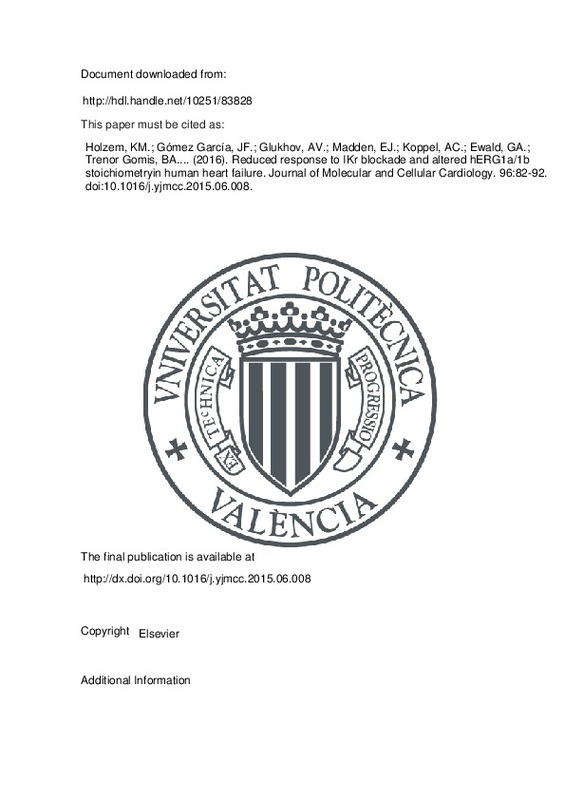JavaScript is disabled for your browser. Some features of this site may not work without it.
Buscar en RiuNet
Listar
Mi cuenta
Estadísticas
Ayuda RiuNet
Admin. UPV
Reduced response to IKr blockade and altered hERG1a/1b stoichiometryin human heart failure
Mostrar el registro sencillo del ítem
Ficheros en el ítem
| dc.contributor.author | Holzem, Katherine M.
|
es_ES |
| dc.contributor.author | Gómez García, Juan Francisco
|
es_ES |
| dc.contributor.author | Glukhov, Alexey V.
|
es_ES |
| dc.contributor.author | Madden, Eli J.
|
es_ES |
| dc.contributor.author | Koppel, Aaron C.
|
es_ES |
| dc.contributor.author | Ewald, Gregory A.
|
es_ES |
| dc.contributor.author | Trénor Gomis, Beatriz Ana
|
es_ES |
| dc.contributor.author | Efimov, Igor R.
|
es_ES |
| dc.date.accessioned | 2017-06-27T13:34:30Z | |
| dc.date.available | 2017-06-27T13:34:30Z | |
| dc.date.issued | 2016-07 | |
| dc.identifier.issn | 0022-2828 | |
| dc.identifier.uri | http://hdl.handle.net/10251/83828 | |
| dc.description.abstract | Heart failure (HF) claims 250,000 lives per year in the US, and nearly half of these deaths are sudden and presumably due to ventricular tachyarrhythmias. QT interval and action potential (AP) prolongation are hallmark proarrhythmic changes in the failing myocardium, which potentially result from alterations in repolarizing potassium currents. Thus,we aimed to examinewhether decreased expression of the rapid delayed rectifier potassiumcurrent, IKr, contributes to repolarization abnormalities in human HF. Tomap functional IKr expression across the left ventricle (LV), we optically imaged coronary-perfused LV free wall from donor and end-stage failing human hearts. The LV wedge preparation was used to examine transmural AP durations at 80% repolarization (APD80), and treatment with the IKr-blocking drug, E-4031, was utilized to interrogate functional expression. We assessed the percent change in APD80 post-IKr blockade relative to baseline APD80 (ΔAPD80) and found that ΔAPD80s are reduced in failing versus donor hearts in each transmural region, with 0.35-, 0.43-, and 0.41-fold reductions in endo-, mid-, and epicardium, respectively (p = 0.008, 0.037, and 0.022). We then assessed hERG1 isoform gene and protein expression levels using qPCR and Western blot. While we did not observe differences in hERG1a or hERG1b gene expression between donor and failing hearts, we found a shift in the hERG1a:hERG1b isoform stoichiometry at the protein level. Computer simulations were then conducted to assess IKr block under E-4031 influence in failing and nonfailing conditions. Our results confirmed the experimental observations and E-4031-induced relative APD80 prolongationwas greater in normal conditions than in failing conditions, provided that the cellularmodel of HF included a significant downregulation of IKr. In humanHF, the response to IKr blockade is reduced, suggesting decreased functional IKr expression. This attenuated functional response is associated with altered hERG1a:hERG1b protein stoichiometry in the failing human LV, and failing cardiomyoctye simulations support the experimental findings. Thus, of IKr protein and functional expression may be important determinants of repolarization remodeling in the failing human LV. | es_ES |
| dc.description.sponsorship | We thank the Translational Cardiovascular Biobank & Repository (TCBR) at Washington University for provision of donor/patient records. The TCBR is supported by the NIH/CTSA (UL1 TR000448), Children's Discovery Institute, and Richard J. Wilkinson Trust. We also thank the laboratory of Dr. Sakiyama-Elbert for the use of the StepOnePlus equipment We appreciate the critical feedback on the manuscript by Dr. Jeanne Nerbonne. This work has been supported by the National Heart, Lung & Blood Institute (NHLBI, R01 HL114395). K. Holzem has been supported by the American Heart Association (12PRE12050315) and the NHLBI (F30 HL114310). | en_EN |
| dc.language | Inglés | es_ES |
| dc.publisher | Elsevier | es_ES |
| dc.relation | Richard J. Wilkinson Trust | es_ES |
| dc.relation.ispartof | Journal of Molecular and Cellular Cardiology | es_ES |
| dc.rights | Reserva de todos los derechos | es_ES |
| dc.subject | Heart failure | es_ES |
| dc.subject | Arrhythmias | es_ES |
| dc.subject | Potassium channels | es_ES |
| dc.subject | Remodeling | es_ES |
| dc.subject | Repolarization | es_ES |
| dc.subject.classification | TECNOLOGIA ELECTRONICA | es_ES |
| dc.title | Reduced response to IKr blockade and altered hERG1a/1b stoichiometryin human heart failure | es_ES |
| dc.type | Artículo | es_ES |
| dc.identifier.doi | 10.1016/j.yjmcc.2015.06.008 | |
| dc.relation.projectID | info:eu-repo/grantAgreement/NIH//UL1TR000448/ | es_ES |
| dc.relation.projectID | info:eu-repo/grantAgreement/NIH//R01HL114395-04/ | es_ES |
| dc.relation.projectID | info:eu-repo/grantAgreement/NIH//F30HL114310/ | es_ES |
| dc.relation.projectID | info:eu-repo/grantAgreement/AHA//12PRE12050315/ | es_ES |
| dc.rights.accessRights | Abierto | es_ES |
| dc.contributor.affiliation | Universitat Politècnica de València. Departamento de Ingeniería Electrónica - Departament d'Enginyeria Electrònica | es_ES |
| dc.description.bibliographicCitation | Holzem, KM.; Gómez García, JF.; Glukhov, AV.; Madden, EJ.; Koppel, AC.; Ewald, GA.; Trénor Gomis, BA.... (2016). Reduced response to IKr blockade and altered hERG1a/1b stoichiometryin human heart failure. Journal of Molecular and Cellular Cardiology. 96:82-92. https://doi.org/10.1016/j.yjmcc.2015.06.008 | es_ES |
| dc.description.accrualMethod | S | es_ES |
| dc.relation.publisherversion | http://dx.doi.org/10.1016/j.yjmcc.2015.06.008 | es_ES |
| dc.description.upvformatpinicio | 82 | es_ES |
| dc.description.upvformatpfin | 92 | es_ES |
| dc.type.version | info:eu-repo/semantics/publishedVersion | es_ES |
| dc.description.volume | 96 | es_ES |
| dc.relation.senia | 293281 | es_ES |
| dc.identifier.eissn | 1095-8584 | |
| dc.identifier.pmcid | PMC4683114 | en_EN |
| dc.contributor.funder | American Heart Association | es_ES |
| dc.contributor.funder | National Institutes of Health, EEUU | es_ES |
| dc.contributor.funder | Children's Discovery Institute | es_ES |







![[Cerrado]](/themes/UPV/images/candado.png)

